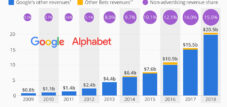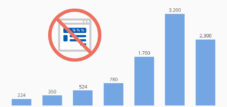Published on: May 9, 2025 / update from: May 9, 2025 - Author: Konrad Wolfenstein

Google and political advertising: transparency, manipulation and regulation in the digital age - Image: Xpert.digital
Political advertising under the magnifying glass: Google role in an ethical debate
Transparency versus tactics: The controversy around Kamala Harris and Google ads
In the United States, the use of digital platforms for political advertising at the center of growing public debates, especially after the unveiling that Kamala Harris' campaign team has manipulated headings of news articles in Google ads. This controversy highlights the complex challenges in the regulation of political advertising in digital space and underlines the importance of transparency and ethical standards. The following report examines the controversy in detail, analyzes Google's current and future policy on political advertising and regulatory developments in the European Union.
The Harris campaign and the manipulated headlines
In August 2024 it was announced that the Kamala Harri's presidential campaign switched on Google ads paid, the headings and descriptions of news articles changed to draw a more positive image of the candidate. These ads linked to real articles of renowned news sources such as The Guardian, Reuters, CBS News and Associated Press, presented manipulated headlines and description texts.
A specific example of this is an advertisement that linked to an NPR article (National Public Radio) with the changed heading “ Harris Will Lower Health Costs ” and the accompanying text “ Kamala Harris will lower the cost of high-quality affordable health care ”. Another ad, which led to a Guardian article, carried the heading “ VP Harris Fights Abortion Bans – Harris Defends Repro Freedom ” and contained the supportive text “ VP Harris is a champion for reproductive freedom and will stop Trump’s abortion bans ”.
Reactions of the affected media
Most of the affected news organizations knew nothing about this practice and were worried about the unauthorized use of their brands. A Guardian spokesman said: "We have to make sure that our brand is used appropriately and with our permission. We will contact Google for more information about this practice." Similarly, a spokesman for the USA-Muttergesellschaft Gannett commented: "As a news organization, we are obliged to ensure that our stories are appropriately shared and meet the highest standards for integrity and accuracy."
The Associated Press made it clear that it "did not know about this practice nor allowed it to run on her website". These reactions illustrate the concern of media companies for their credibility and editorial integrity.
Ethical concerns and legal classification
Google's position on advertising practice
Google defends this practice as a controller, since the advertisements are clearly marked as "sponsored" and contain a "paid" note. "These ads are expressly identified as 'sponsored' so that they can easily be distinguished from search results," said a Google spokesman. The company considers it to be "quite common for advertisers linking or citing them in their ads on external websites, including news sites".
Critical voices of media experts
Despite the legality of the practice, media experts express considerable ethical concerns. Rich Hanley, emeritus extraordinary professor of journalism at Quinnipiac University, described the procedure as “disturbing” and “exploitative”. He argues: "What you actually do is manipulate the content of another by changing headings. There should be a clear and clear limit when it comes to news organizations."
Colin Campbell, extraordinary professor of marketing at the University of San Diego, described the ads as a “significant ethical problem” and criticized that “users can misunderstand the importance of the articles”. Practice raises fundamental questions about the integrity of political communication and the responsibility of digital platforms.
Google's transparency measures for political advertising
The ADS Transparency Center
Google has invested significantly in transparency measures for political advertising in recent years. The company operates an “Ads Transparency Center”, a searchable directory of advertisers and their advertisements on Google platforms. Users can search for advertisers there to learn more about them and their ads and filter the results according to criteria such as the date or geographical target area.
Requirements for political advertisers
Since 2019, all advertisers who want to switch on voting advertising in the EU have to meet increased transparency requirements, including identity verification and information in the ads that clearly show who paid for each advertisement. Google has also introduced disclosure obligations for the use of synthetic or digitally modified content in election advertising.
The EU regulation and Google's withdrawal from political advertising
The new EU regulation on political advertising
On March 9, 2024, the EU Ordinance on Transparency and Targeting came into force in political advertising (TTPA), which will be fully applied from October 10, 2025. This ordinance defines political advertising more comprehensively than before and not only includes direct voting advertising, but also advertisements, “which are suitable and intended to influence the result of a choice or a referendum, vocal behavior or a legislative or regulatory process on European, national, regional or local level”.
The main aspects of the regulation include:
- Labeling obligation for political advertising with information on sponsors and paid remuneration
- Strict restrictions on targeting and profiling based on personal data
- Prohibition of the targeted address of people under election age
- Exceptional prohibition of profiling and targeting with sensitive data
- Creation of a new EU archive for political online advertising
- Prohibition of political advertising from third countries three months before an election or a referendum
Google's decision to retreat
In response to this new regulation, Google announced in November 2024 that it was no longer a political advertising in the EU before the TTPA came into force in October 2025. The company justifies this step with “significant new operational challenges and legal uncertainties”.
Google particularly criticizes the broad definition of political advertising in the regulation, which could “include ads an extremely broad spectrum of topics that would be difficult to identify on a large scale”. The company also criticizes the “lack of reliable local election data that would enable consistent and precise identification of all advertisements in connection with local, regional or national elections in one of the 27 EU member states”.
Effects on digital political communication
Consequences for civil society organizations
Google's withdrawal from political advertising in the EU could be particularly problematic for smaller organizations and civil society groups. These are often dependent on inexpensive digital advertising in order to reach their audience. Civil society has expressed concerns during the entire legislative procedure that a too broad definition of political advertising could also affect legitimate forms of communication.
Google's decision could also “further tighten the challenges for civil society or hinder the establishment of new political parties, which are often dependent on Big Tech platforms to reach their audience”.
Balance between regulation and freedom of opinion
The controversy around the Harris campaign and Google's reaction to EU regulation shows the area of tension between the legitimate interest in transparency and protection against manipulation on the one hand and ensuring an open political discourse on the other. Critics of the EU Ordinance, including non-governmental organizations, fear “over-regulation” and warn of a “endangerment of freedom of expression”.
The way to responsible political advertising
The controversy around Kamala Harris' Google ads and Google's decision to withdraw from political advertising in the EU illustrate the complexity of regulation political advertising in the digital age. Both cases underline the need for a balanced approach, which guarantees both transparency and protection against manipulation, and promotes freedom of expression and political discourse.
The manipulated ads of the Harris campaign show the limits of self-regulation of platforms. While Google emphasizes that the ads are marked as "sponsored", this may not be enough to prevent misleading. At the same time, Google's withdrawal from political advertising in the EU raises the question of whether the new regulation is practical in its current form or whether it should be revised to find better balance between regulation and practical feasibility.
For the future, it seems crucial to develop clear and enforceable standards for political advertising that offer sufficient transparency without excessive political communication. This requires a continuous dialogue between platforms, regulatory authorities, media and civil society to find solutions that are both technically implementable and ethically justifiable and ultimately help to strengthen the public's trust in digital political communication.
Suitable for:
Your global marketing and business development partner
☑️ Our business language is English or German
☑️ NEW: Correspondence in your national language!
I would be happy to serve you and my team as a personal advisor.
You can contact me by filling out the contact form or simply call me on +49 89 89 674 804 (Munich) . My email address is: wolfenstein ∂ xpert.digital
I'm looking forward to our joint project.











